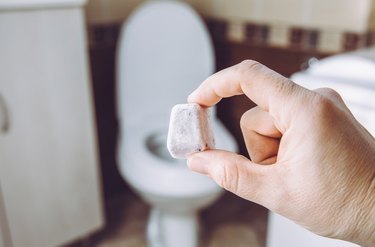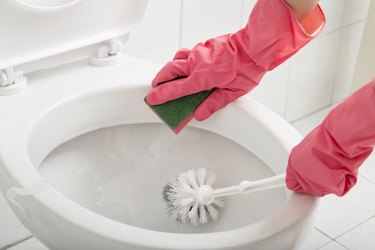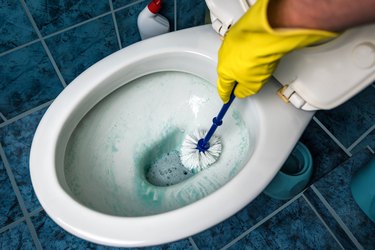
Cleaning a toilet may be one of the least favorite household chores, but it's integral to maintaining a clean bathroom. With countless toilet bowl cleaners on the market, from liquid cleaners to tablets, finding the most effective one can feel like looking for a needle in a haystack. When looking for a low-maintenance option, chlorine tablets for toilets may come to mind, but are they safe to use?
Can Chlorine Tablets Be Used in Toilets?
Video of the Day
Chlorine is most commonly associated with swimming pools. It helps keep pools clean and prevents algae growth. When you're looking for a low-maintenance way to keep your toilet clean, dropping a few chlorine tablets into your toilet tank may seem like an ingenious solution. However, it is not. While chlorine tablets are safe for pools, they are unfortunately not safe for toilets. In fact, using chlorine tablets in a toilet may cause serious damage over time.
Video of the Day
Avoid any type of cleaner that will sit in the tank. While some products are advertised as safe toilet tank tablets, extended use can cause parts of the toilet to wear much quicker than they should. Pieces of the tablets can also cause pipe blockages when flushed. This is because the longer a cleaner sits in a toilet tank, the more time the chemicals have to eat away at the thinner parts of the toilet's material, and this releases chemicals. While some tablets may direct you to leave them in the tank for two weeks, some may require you to leave them in for up to 30 days. Eventually, the damage will add up.
Some toilets have a manufacturer warning on their label, which indicates that if you use drop-in tablet toilet cleaners, your warranty will be considered void. Companies include this warning because they are aware of the premature damage extended use of drop-in tablets can cause, let alone chlorine tablets for the toilet.
Toilet Bowl Cleaner Considerations

Since chlorine tablets are best avoided, there are fortunately many other options available to you. When you're choosing a toilet bowl cleaner, consider how involved you want to be in the cleaning process. For example, a cleaner with a squirt dispenser and disposable pads allows you to keep your distance when applying the cleaner. You may also want to consider the types of stains you deal with most often. For example, if you wish to remove hard-water stains, which appear as chalky buildup, you will need to purchase a cleaner that targets hard-water stains.
Nonchemical Cleaners and Other Forms
If you wish to avoid chemicals, there are natural cleaners on the market. These are typically made from citric acid, baking soda, vinegar and essential oils to tackle toilet stains. However, these cleaners are not always strong enough to remove stains like chemical cleaners can.

Besides tablets, toilet bowl cleaners come in many forms, such as liquid, powder and gel-based formulas. Choosing a form comes down to preference. While liquids are the most common, powders are inexpensive, and gel-based formulas usually come with an easy squirt dispenser. Some liquid forms are available as concentrates, in which case you will need to dilute the solution in water before it is sprayed onto the bowl and wiped down. Always check the manufacturer's instructions before using a toilet bowl cleaner.